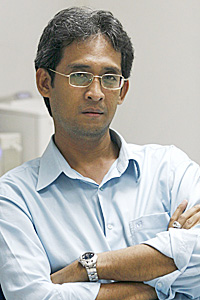
The general election results on Sunday shocked many people after the Democrat Party lost all its seats in Bangkok where it had won 23 out of 33 MP seats in the 2011 election.
Apart from the capital, the Democrats also lost many seats in the South and lower North which have traditionally been strongholds. For many former MPs, it was their first loss in constituencies where they had always secured victory in the past.
The bitter results forced Abhisit Vejjajiva to resign as party leader to keep the promise he made during the election campaign that he would do so if the party failed to gain at least 100 seats.
The country's oldest and previously second-largest political party, which was widely expected to be the runner-up to the Pheu Thai Party this time, has become a mid-sized party overnight. Unofficial results show the party won only 29 constituency seats and approximately 20 party-list MPs.
Observers have pointed out several factors that likely led to the collapse of the Democrats, including internal conflicts which divided the party into factions and a new constitution that is unfavourable to large parties.
Several people, including some key party members, blamed the loss on Mr Abhisit's moves in the last leg of the campaign for the downfall of the party. Two weeks before the ballot, Mr Abhisit announced that he would not support Prime Minister Gen Prayut Chan-o-cha, the prime ministerial candidate of the pro-regime Palang Pracharath Party (PPRP), to return as prime minister.
Critics say Mr Abhisit's strategy was a mistake because it pushed away party supporters who wanted Gen Prayut to continue his premiership.
Mr Abhisit's announcement saw the party turn from ally to a rival of the PPRP.
Mr Abhisit's stance may have been a misstep in terms of the election result. However, I believe what he did was the right thing for a politician in a democracy to do.
With his long experience in politics, Mr Abhisit may well have foreseen the potential negative political consequences of his announcement but he still went through with it.
A clear public political stance allows voters in a democracy to make an informed decision, while Mr Abhisit showed his integrity by choosing not to back a leader who came into office by toppling an elected government.
The downfall of the Democrats has stunned me even though I did not vote for the party in this election. Frankly speaking, I used to be a supporter of the party a long time ago. Back then, Mr Abhisit in his early days in politics impressed me a lot with his wisdom and talent.
In early 1992, at the height of the popularity of Chamlong Srimuang, then the leader of the Palang Dharma Party -- known as "Chamlong fever", Mr Abhisit, who was a new-face Democrat candidate, shone during an electoral debate with Mr Chamlong and the late Samak Sundaravej, leader of the Prachakorn Thai Party, which then gained the majority of MP seats in Bangkok. His speech countered not only that of Mr Chamlong but also Samak's. At the end of the debate, both men came to shake hands with Mr Abhisit, showing their respect for him.
After that, Mr Abhisit emerged as the only Democrat to win a seat in Bangkok in that election. The Democrats also won a plurality of seats in the 1992 election and led a coalition government.
Unfortunately, the party could not maintain its power. When the former party leader Chuan Leekpai took up his second tenure as prime minister in 1997, no one doubted his honesty. However, many people felt disappointed with his slow decision making, especially after the country was hit hard by the 1997 Tom Yum Kung financial crisis.
This is because Mr Chuan, with his background as a lawyer, wanted to ensure that all his decisions were legally correct in order to prevent further consequences.
When Mr Abhisit took office as prime minister in 2008, his government maintained that conservative style under the shadow of the old generation of the party's executives. This affected the party's standing among the electorate somewhat.
Before that, his own decisions had also damaged his reputation. In 2006, he led the party to engage in street protests against governments of the pro-Thaksin Shinawatra camp and boycotted an election in that year. This dragged the party into a power game. It also subjected the Democrats to criticism of undermining the parliamentary system.
Sunday's election is not the first time that the party has suffered a serious setback. Over the 72 years of its existence, the Democrats have experienced several downfalls, including its shattering loss in the 2005 election when the party was defeated by Thaksin's now-dissolved Thai Rak Thai Party which swept to a landslide victory with 377 MPs.
Still, after each setback, the party has always recovered. This is because the Democrats have been established for so long and are considered to be as much a "political institution" as a political party. Unlike several other parties, the Democrats have no one who is considered to be their owner and the party relies on the decisions of its members rather than those of any one person.
Today, despite failing to bring success to the oldest party on Sunday, Mr Abhisit can still play an important role in the politics of the country going forward.
I believe the Democrats will enjoy a political revival once they find the right person to lead them, as was the case during the party's glory days.
Soonruth Bunyamanee is the editor of the Bangkok Post.
